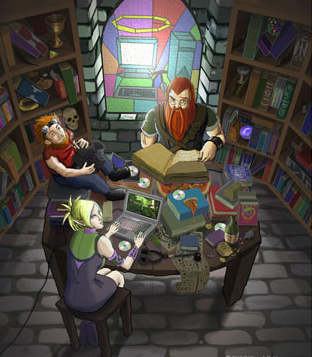People who have enjoyed a course in college in which they read (normally in translation) works of medieval literature or took a course in medieval art history have a solid basis for persuasively articulating an idea of the Middle Ages and its significance to them and our culture in general.
— Norman F. Cantor, Inventing the Middle Ages, p. 44
June 30, 2014
Carol L. Robinson (www.cyberspacerobinson.org)
I keep thinking about the discussions that have been happening — in the hallways, perhaps, but mostly online, in journal articles, in book publications, and at conferences, such as the International Congress on Medieval Studies — discussions about the future of medieval studies as a discipline. Karl Fugelso concluded in his Editorial Note for the most recently published Studies in Medievalism XXIII: Ethics and Medievalism: “As many authors in this volume underscore, medievalists — and the scholars who study them — may have a significant influence on the world beyond them, and it is incumbent on us to discern and appreciate that impact” (xv). Looking upon the broad spectrum of concerns from another angle, J. J. Cohen wrote (just a little over two years ago): “What we must commit to undertaking together in the face of this prospective precariousness is the forging of the future that we desire and the humanities deserve” (“The Future of Medieval Studies“). I applaud the expressed concerns, the proposed solutions, the calls to action. They remind me of the implied concerns made by Norman F. Cantor in his late 20th-century book, Inventing the Middle Ages.
Hence, I have decided to begin this little essay with the quote by Cantor because (at the risk of sounding too much like that Whitney Houston song, and I apologize if I have caused any incidents of earworm), I believe the students are our future. However, there doesn’t seem to be much out there to encourage medieval studies among undergraduate students, particularly in the way of contests. There doesn’t seem to be much. At a quick glance through Google, this is what I found:
- The 29th Annual Hoggetowne Medieval Faire Student Art & Essay Contest is for pre-college students (kindergarten through high school) living in the Gainesville, Florida area. “The theme for the 2015 Hoggetowne Medieval Faire is ‘In the Days of Robin Hood.'”
- Soceity for Medieval Feminist Scholarship is for graduate students. The essays should “engage in interesting ways with questions of gender and/or sexuality in the Middle Ages. Papers in all disciplines are encouraged.” The deadline for submission for the 2014 competition is Monday, September 15, 2014.
- One final example is the BABEL Working Group’s Michael Camille Essay Prize, which “is open to early career researchers: those currently in M.A./Ph.D. programs or within 5 years of having received the Ph.D..”
I found a few other undergraduate and graduate contests, but these were open only to student attending that particular college or university. Something else that Karl Fugelso once wrote also haunts me: “All of our enterprises are to some degree corporate, and it is up to us to steer their drive for profit towards fruitful dialogue, including discussion of those motives” (Studies in Medievalism XXI: Corporate Medievalism xii). In other words, I see a tiny hole that Medieval Electronic Multimedia Organization might fill, one that responds to the pleasure students gain when they learn to appreciate medieval history, literature, and art — when they have established within themselves “a solid basis for persuasively articulating an idea of the Middle Ages and its significance to them and our culture in general.”
In an interview published about a year ago, Thomas Pettitt (author of the Gutenberg Parenthesis theory) observed:
With the right spelling, “media studies” is contained within “mediaeval studies”. One of those neat cabbalistic things that means nothing in itself but is useful for making you think: a medievalist can be a futurist because the Gutenberg Parenthesis tells us the future is medieval.
So, it seems almost appropriate that, in the next few months, Medieval Electronic Multimedia Organization will begin a student works contest. I do not yet know what the prizes will be, but I do know that winners will be published on this blog: essays, research papers, videos, and creative works. (On the 30th of each month, a selected undergraduate student essay will be published.) I am thinking that it might involve some prize money, too. The student works (creative or researched) should be on either medieval works that have been adapted into electronic media (film, video games, television, music, . . .) or are medievalist in some other way. I am open to suggestions, so if you have any, please send them to me (Carol Robinson) at clrobins@kent.edu.
With the right spelling, “media studies” is contained within “mediaeval studies”. One of those neat cabbalistic things that means nothing in itself but is useful for making you think: a medievalist can be a futurist because the Gutenberg Parenthesis tells us the future is medieval. – See more at: http://www.cjr.org/the_audit/the_future_is_medieval.php?page=all#sthash.UEMEEBML.dpuf
Details regarding this contest and the publishing of quality undergraduate essays will be forthcoming in August, 2014.

